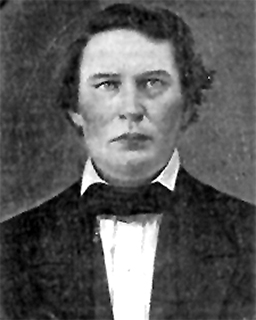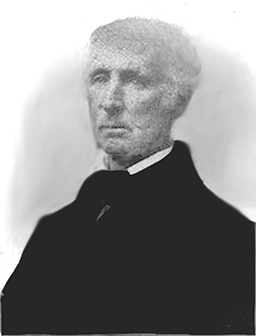|
Although pro-Union, Kentucky did have
Confederate governors Johnson, Hawes
In answer to those readers who have asked…
Yes, Kentucky did have a Confederate governor – in fact, it had two of them.
Interestingly, Confederates, at one time, even briefly installed a Confederate governor in the state capital at Frankfort.
Kentucky was divided during the Civil War between pro-Confederates, pro-Unionists and staunch neutralists. The Unionists eventually prevailed, aided by native-son Abraham Lincoln who, sensing military defeat if Kentucky joined the Confederacy, made a special effort to keep Kentucky within the fold.
Southern sentiment, however, was strong in Kentucky. A meeting of pro-Confederate delegates was held at Russellville Nov. 18, 1861 for the purpose of "severing forever our connection with the Federal Government." Led by George W. Johnson (1811-1862), a lawyer from Georgetown, the convention formed a provisional government with 10 councilmen and provided for other officials to be selected later.
The delegates unanimously chose Johnson for governor and selected Bowling Green as the capital of Confederate Kentucky. At that time, the army of Confederate Gen. Albert Sidney Johnston was encamped at Bowling Green and offered protection for the provisional government.
However, with Union armies victorious at Mill Springs and on the verge of victories at Forts Henry and Donelson, Johnston was in imminent danger of being outflanked on both his right and his left. To escape what he conceived as a trap, the general vacated Bowling Green and moved his army to Tennessee. This move left Gov. Johnson's government unprotected at Bowling Green and he and the council withdrew and fled to the Confederate Army in Tennessee.
In April 1862, Gen. Johnston surprised and temporarily routed Union Gen. Ulysses S. Grant at Shiloh. One unlikely participant was Gov. Johnson, a civilian with a crippled arm. During the morning's battle, the governor had a horse shot out from under him. That evening, Johnson had himself sworn into the Confederate army as a private. But his luck changed the next day as he was shot twice, once in the thigh and once in the abdomen.
Unable to move and unattended, the governor lay until the following day when he was miraculously spotted by an old acquaintance, Union Gen. Alexander McCook, who happened to be riding past. McCook took the stricken governor to a U.S. transport where he received medical attention. Although dying, Johnson wrote a number of farewell messages before he died, and his remains were packed in salt and shipped to Georgetown where he was buried with an impressive funeral.
The gubernatorial vacancy left by Johnson’s death was filled by vote of the council, who selected Richard Hawes (1797-1877), a prominent Paris lawyer who had actively opposed Kentucky's entrance into the war.
Hawes and his entourage joined Confederate Gen. Braxton Bragg for a train ride to Frankfort Oct. 3, 1862 as Bragg had made plans for Hawes’ inauguration as governor. Arriving, they found that the Unionist government had fled. The inauguration got under way the next morning with Gen. Kirby Smith leading a large cavalry escort for Gov. Hawes, the council, and other dignitaries to the State Capitol.
With the inauguration completed, the guests retired to the dining room. At 1:30 p.m., while everyone was enjoying a sumptuous dinner, Bragg handed Gen. Polk a note stating that an enemy in heavy force was only 12 miles away. In short order, Union shells began bursting in Frankfort and a hasty evacuation resulted.
Hawes and other government members slipped quietly out of town that afternoon and, still trying to retain some semblance of a state government, returned to Tennessee. In the ensuing war years, Hawes traveled widely, always seeking support for his government. He sometimes conferred with Confederate officials, including President Davis, but as the war progressed he found less and less interest in his provisional government. Hawes always put up a bold front, maintaining that "a large majority of Kentuckians are Confederates."
After the war, Hawes resumed his law practice and began restoring his war-damaged property. Well received in his hometown, Hawes returned to active participation in politics right up until his death on May 25, 1877. He died in office as Bourbon County Judge. His funeral at Paris was the largest and most elaborate ever held there.
|
|
 |
 |
|
|











